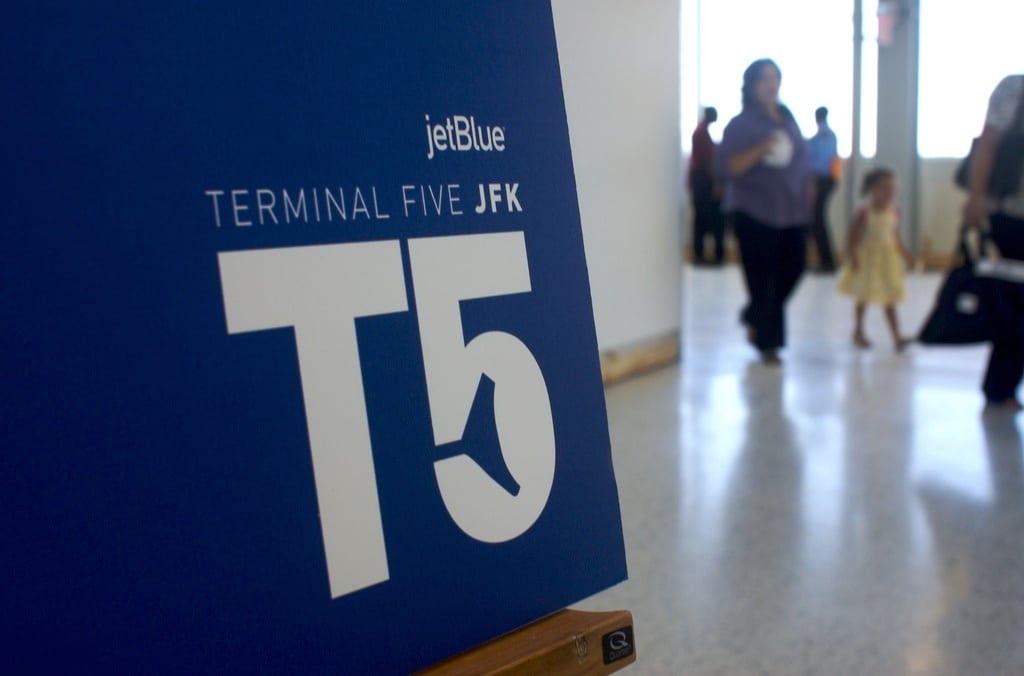Skift Take
This is a smart move from JetBlue which by virtue of being the biggest domestic into the big U.S. international hub of JFK, is strategically placed very well with these real codeshare agreements.
JetBlue Airways Corp. , whose dominance at New York’s Kennedy airport has helped it thrive without a global airline alliance, plans to share flight-booking codes with major carriers for the first time.
So-called two-way code shares, in which carriers book passengers on each other’s flights and share revenue, may start as soon as this year, Chief Executive Officer Dave Barger said in an interview yesterday. The New York-based carrier hasn’t ruled out any potential partners for the agreements, he said.
JetBlue is the largest domestic airline at John F. Kennedy International Airport, and more than half its flights originate there. Code-sharing accords would let the company team with larger U.S. airlines and some of the more than 60 international carriers using Kennedy as a base for overseas flights.
“The value of JFK has never been utilized successfully by any other airline,” Barger said. “This is a terrific gateway and we’re sitting there as the largest domestic airline. It’s very valuable for us and for our partner airlines.”
Code shares most often are used by airlines within the same global alliance, allowing them to share ticket revenue without each assuming the full cost of operating a flight. Alliances, like Oneworld and SkyTeam, also let members jointly market flights and reduce spending by sharing some airport, maintenance or operating facilities.
‘Unknown Territory’
JetBlue doesn’t belong to a global alliance and instead has 22 so-called interline agreements, which allow each airline to sell tickets on specific partner flights and check bags on a full itinerary, with revenue split on a pro-rated basis. Most of JetBlue’s interline partners are based outside the U.S.
The airline’s decision in 2010 to use Sabre Holdings Corp. for its reservation and customer service systems gave it the technology to consider two-way code shares, Barger said. Its only prior two-way agreement, with regional carrier Cape Air, expired in 2011.
“We are charting unknown territory,” Barger said. “It’s likely that two-way code share will be part of our landscape as we move into 2013 and 2014.”
New revenue would be a boost for the sixth-largest U.S. airline, whose fourth-quarter sales of $1.19 billion trailed analysts’ estimates after superstorm Sandy forced flight cancellations and reduced travel demand.
JetBlue was downgraded today to underperform from market perform by Savanthi Syth, a Raymond James Financial Inc. analyst who cited the carrier’s “relatively high costs.” The shares fell 3.5 percent to $5.86 at 10:35 a.m. in New York. They gained 4.4 percent in the 12 months that ended yesterday.
Revenue Split?
JetBlue hasn’t decided how it would split revenue with code-share partners and wants to get feedback from employees on such plans as it moves ahead, Barger said.
“We don’t want to be negatively impacted by flying the short route to someone flying 7,000 miles,” Barger said. “It has to be worth it for us if we’re flying someone 299 air miles from Buffalo.”
In addition to interline accords, JetBlue also has one-way code shares with six carriers, in which the international partner puts its airline designation on certain JetBlue flights and markets the segments as their own. Specific terms are negotiated with each partner, with JetBlue receiving rates close to the local fares in each revenue class.
Last year, the carrier agreed to a one-way code share with Air China Ltd. and has existing one-way code shares with Deutsche Lufthansa AG (LHA), Emirates, South African Airways, Hawaiian Holdings Inc.’s Hawaiian Airlines and Japan Airlines Co.
To contact the reporter on this story: Mary Schlangenstein in Dallas at [email protected]
To contact the editor responsible for this story: Ed Dufner at [email protected]
The Daily Newsletter
Our daily coverage of the global travel industry. Written by editors and analysts from across Skift’s brands.
Have a confidential tip for Skift? Get in touch
Tags: codeshares, jetblue airways, jfk
Photo credit: JetBlue is the largest domestic airline at John F. Kennedy International Airport, and more than half its flights originate there. Sam / Flickr
